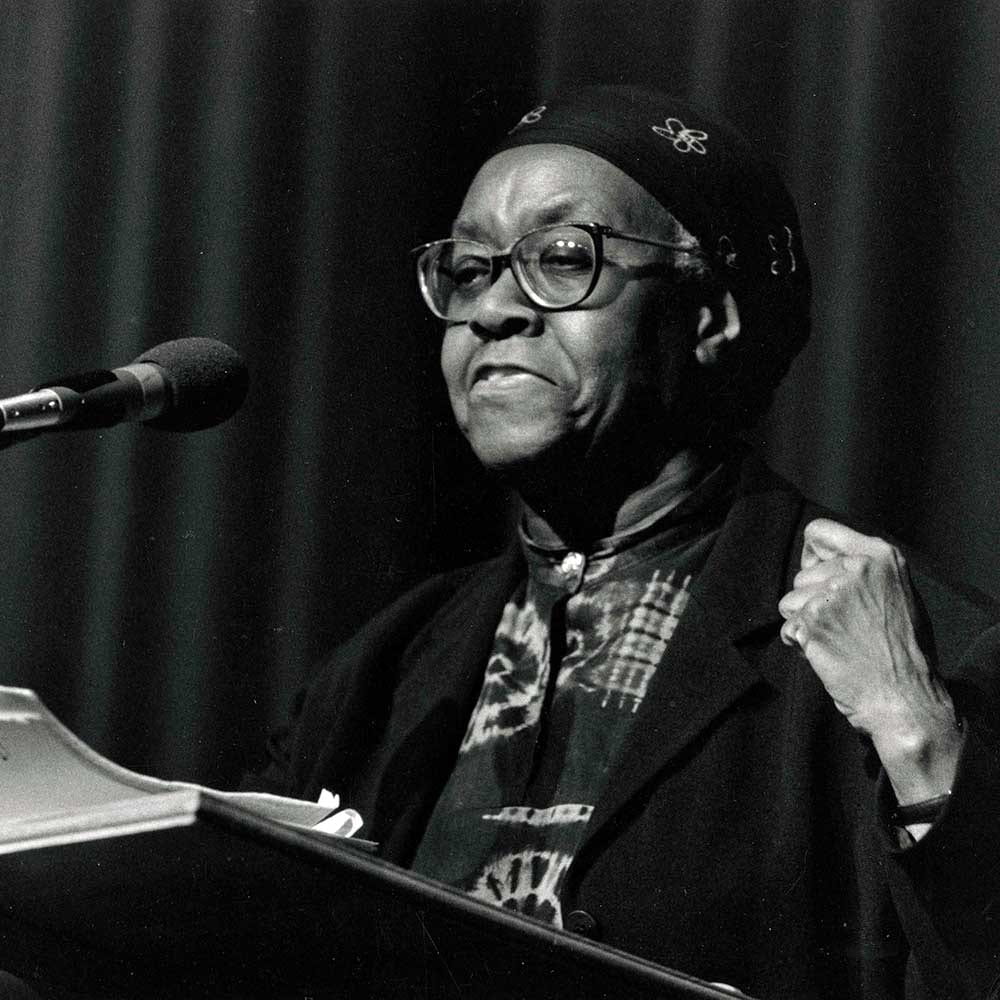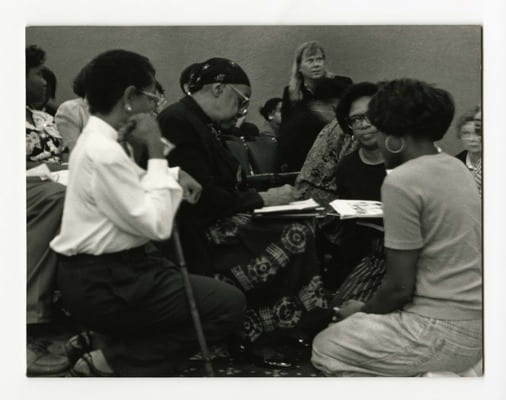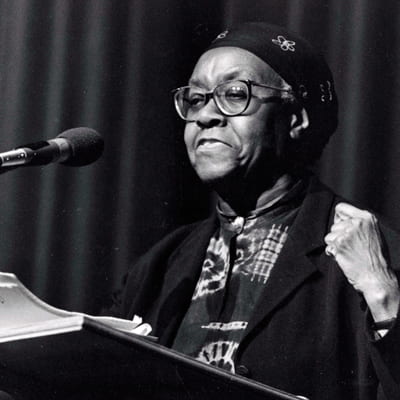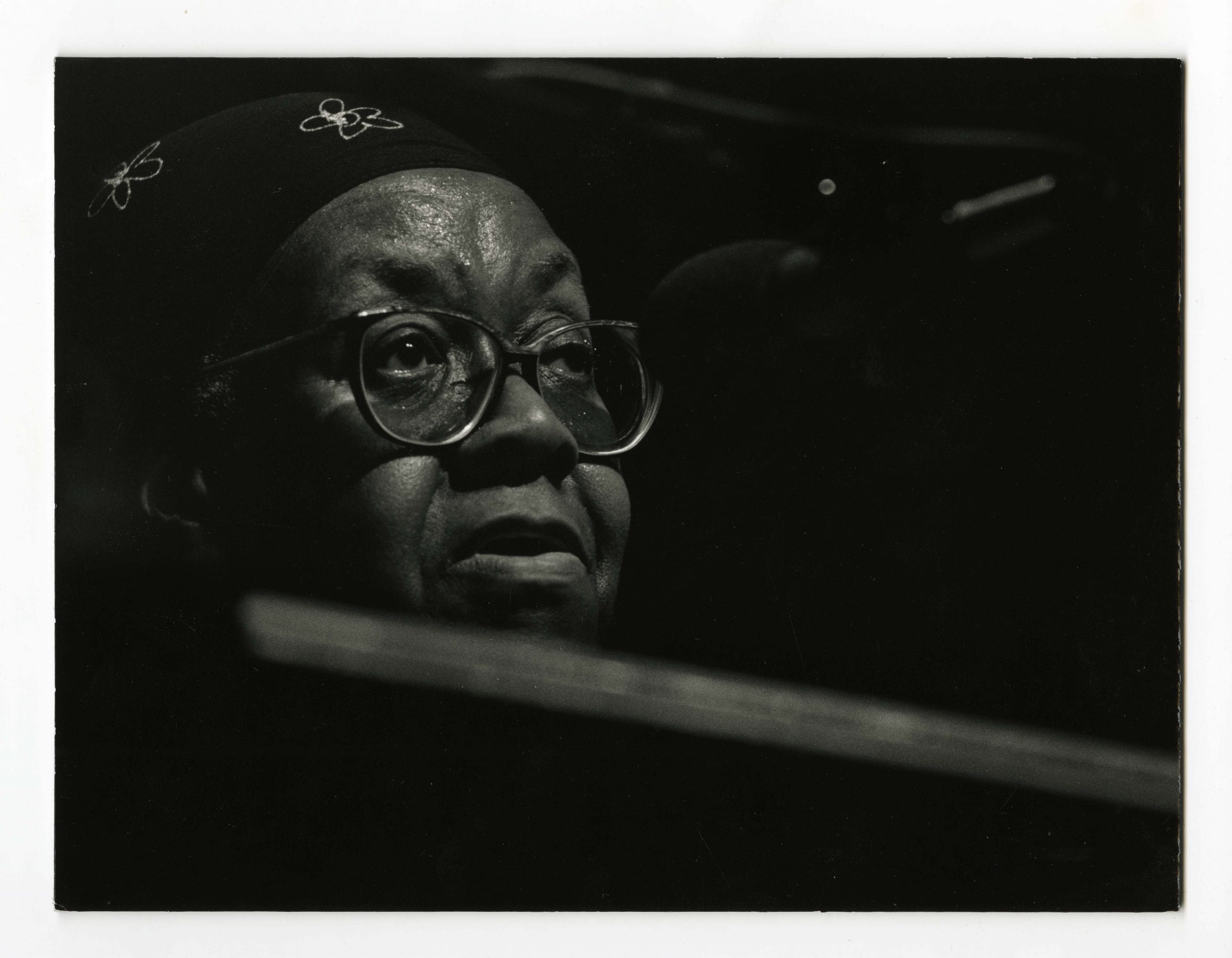Gwendolyn Brooks
“The time cracks into furious flower.
Lifts its face all unashamed. And sways in wicked grace.”

Gwendolyn Brooks, to whom the 1994 Furious Flower Conference was dedicated to, describes writing poetry as “delicious agony,” a process that has produced some of the most outstanding poetry written in the 20th century. Her career has garnered a magnificent array of achievements. In 1950, Brooks won the Pulitzer Prize for Annie Allen (1949), becoming the first black writer to win the award. In 1968, she was named Poet Laureate of Illinois, succeeding the late Carl Sandburg. Brooks was also named Consultant-in-Poetry to the Library of Congress, serving in the position from 1985-1986, and was the first black woman to be so honored. She was the recipient of over seventy honorary doctorates, and in 1980, was nominated to the Presidential Commission on the National Agenda for the Eighties. She authored more than twenty books, including A Street in Bronzeville(1945), Maud Martha (1953), The Bean Eaters (1960), In the Mecca (1968), Blacks(1973), Report From Part One (1972), and Report From Part Two (1996). In 1989, the Poetry Society of America awarded Brooks a Frost Medal, its highest honor, and in 1994, she was named the Jefferson Lecturer by the National Endowment for the Humanities. Passing away in December of 2000 after a long, successful, and inspiring career, a chair was named in her honor at Chicago State University: The Gwendolyn Brooks Distinguished Chair in Black Culture and Literature.
Featured Poems
“We Real Cool”
“I Am a Black”
“Winne”



Interviews, Talks, and Readings
/ Gwendolyn Brooks reads “We Real Cool”
We Real Cool
THE POOL PLAYERS.
SEVEN AT THE GOLDEN SHOVEL.
We real cool. We
Left school. We
Lurk late. We
Strike straight. We
Sing sin. We
Thin gin. We
Jazz June. We
Die soon.
/ Gwendolyn Brooks reads “I Am a Black”
According to my Teachers,
I am now an African-American.
They call me out of my name.
BLACK is an open umbrella.
I am a Black and A Black forever.
I am one of The Blacks.
We are Here, we are There.
We occur in Brazil, in Nigeria, Ghana,
in Botswana, Tanzania, in Kenya,
in Russia, Australia, in Haiti, Soweto,
in Grenada, in Cuba, in Panama, Libya
in England and Italy, France.
We are graces in any places.
I am Black and A Black
forever.
I am other than Hyphenation.
I say, proudly, MY PEOPLE!
I say, proudly, OUR PEOPLE!
Our People do not disdain to eat yams or melons or grits.
or to put peanut butter in stew.
I am Kojo. In West Afrika Kojo
mean Unconquerable. My parents
named me the seventh day from my birth
In Black spirit, Black faith, Black communion.
I am Kojo. I am A Black.
And I Capitalize my name.
Do not call me out of my name.
/ Gwendolyn Brooks reads “Winnie”
Winnie Mandela, she
the non-fiction statement, the flight into resolving fiction,
vivid over the landscape, a sumptuous sun
for our warming, ointment at the gap of our wounding, sometimes
would like to be a little girl again.
Skipping down a country road, singing.
Or a young woman, flirting,
no cares beyond curl-braids and paint
and effecting no change, no swerve, no jangle.
But Winnie Mandela, she,
the She of our vision, the Code,
the articulate rehearsal, the founding mother, shall
direct our choir of makers and wide music
Think of plants and beautiful weeds in the Wilderness
They can’t do a thing about it (they are told)
when trash is dumped at their roots.
Have no doubt they’re indignant and daunted.
It is not what they wanted.
Winnie Mandela, she
is there to be vivid: there
to assemble, to conduct the old magic,
the frightened beauty, the trapped wild loveliness, the
crippled reach,
interrupted order, the stalled clarity.
Listen, my Sisters, Brothers, all ye
that dance on the brink of Blackness,
never falling in:
your vision your Code your Winnie is woman grown.
I Nelson the Mandela tell you so.
Related Links
Interactive Program Day II
Timeline: History, Witness, and the Struggle for Freedom in African American Poetry
“We Real Cool” Lesson Plan